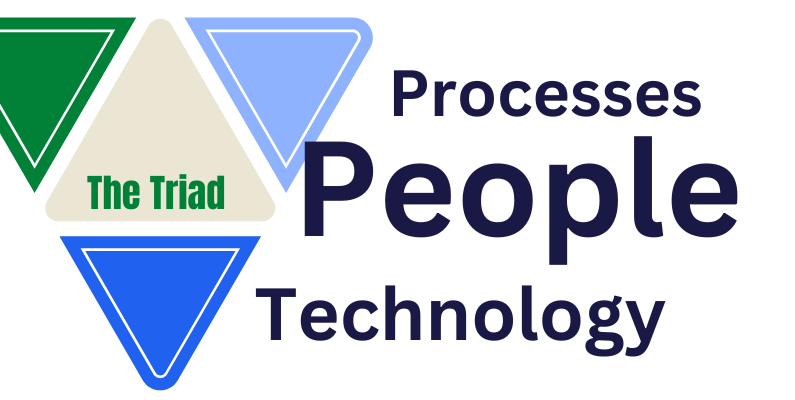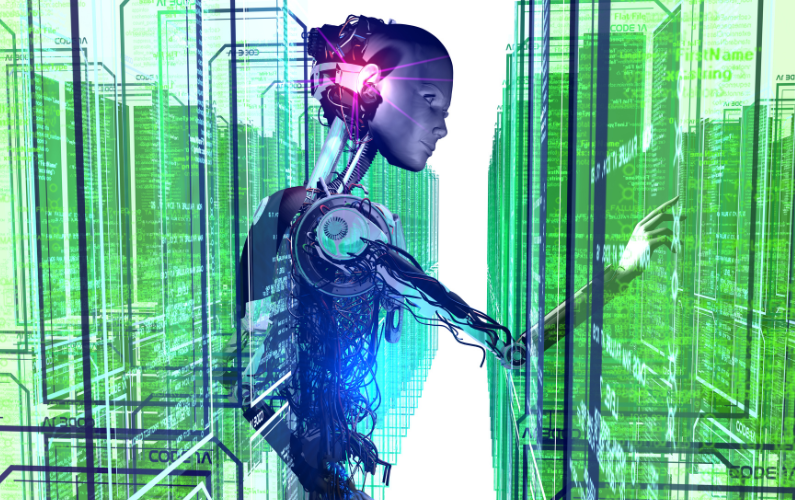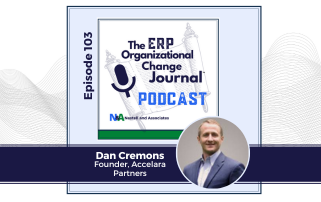ERP Research Colleagues, Thank You for Your Work
In this blog post, I would like to share the work of ERP research colleagues, Dr. Puthuruthy, and Dr. Marath. In their paper, “Leveraging Artificial Intelligence for Developing Future Intelligent ERP Systems” (Puthuruthy, A., & Marath, B. (2024). Leveraging Artificial Intelligence for Developing Future Intelligent ERP Systems. International Journal of Intelligent Systems and Applications in Engineering, 12(8s), 623-629.) the authors discuss how artificial intelligence (AI) may be potentially be used, or further enhanced, within Enterprise Resource Planning (ERP) solutions to account for business and technical challenges and to improve the implementation and utilization of ERP systems.
I would first like to have a brief conversation, and description, of “ERP organizational Change Research” and “ERP Triad”, and then I’ll share some highlights of Puthuruthy & Marath (2024). This article will then conclude with some food for thought about the impact of their work on ERP Organizational change.
Have you ever really reflected on what the ERP landscape will be like next year, in 5 years, in 10 years? Have you ever heard of “Self-healing Systems”? How about self-learning data? Let’s explore some of the possibilities and AI in ERP (i.e. intelligent ERP systems) use cases together as discussed in Puthuruthy & Marath (2024).
A Word on ERP Organizational Change Research
The concept behind “ERP (Enterprise Resource Planning) Organizational Change”, involves leveraging ERP systems to drive improvements and maintain competitiveness within organizations. ERP Organizational Change Research focuses on understanding the challenges and risks associated with ERP implementation and assimilation. Researchers aim to identify success factors and models that can improve ERP adoption and reduce failure rates. The literature emphasizes the importance of addressing critical success factors to increase the likelihood of ERP assimilation and achieve organizational goals.
The value of ERP Organizational Change research lies in its potential to make a tangible difference in the success of ERP initiatives. Failure to effectively implement ERP systems can lead to significant costs, including loss of production, decreased product quality, customer attrition, and wasted resources. ERP failures have been well documented to result in plant closures, bankruptcies, and lawsuits, highlighting the critical importance of successful ERP assimilation. Despite existing challenges and known risks, ERP Organizational Change research seeks to provide objective insights and data to improve ERP implementation practices. The ultimate goal is to enhance ERP organizational change performance through research-based practices, aiming to address persisting issues and improve overall success rates. There has been some good research, with much more to come, on intelligent ERP systems!

What is the “ERP Triad”?
There is an intricate relationship between people, processes, and technology in the landscape of Enterprise Resource Planning (ERP) organizational change, often referred to as the ERP Triad. It emphasizes that successful ERP implementation hinges on effectively managing and balancing these three elements.
Technology
The technological aspect of ERP involves the selection, implementation, and integration of ERP software, IT infrastructure, and emerging technologies like Big Data, Artificial Intelligence (AI), Machine Learning, RFID, Blockchain, and Adoptive ERP. ERP success highlights the importance of staying abreast of technological advancements to enhance operational processes and productivity.
People
Organizational culture, teamwork, leadership, and change management are crucial components of the people aspect of ERP implementation success. ERP success stresses the significance of understanding and addressing the human element in ERP implementation, as it directly impacts the success of organizational change efforts.
Processes
ERP implementation requires a thorough understanding of business processes, project management methodologies, and the ability to adapt to changing business requirements. Effectively aligning ERP systems with existing processes and optimizing workflows are vital for achieving desired outcomes.
The evolving nature of ERP technology (especially with artificial intelligence) prioritizes improved operational processes, workforce empowerment, and integration of emerging technologies. It underscores the importance of holistic insight into ERP organizational change, considering both technical and non-technical aspects, such as teamwork, leadership style, and project management. The idea of the “ERP Triad” emphasizes that the dynamic interplay between people, processes, and technology is fundamental to successful ERP organizational change. It suggests that ongoing research and multidisciplinary approaches will continue to shape the evolution of ERP and its assimilation into organizations, ensuring optimal outcomes in terms of efficiency, cost-effectiveness, and return on investment. This ERP Triad will certainly be impacted by advancements in intelligent ERP systems!
Use Cases of AI in ERP
Puthuruthy and Marath’s paper explores various potential applications of AI in ERP systems, ranging from data entry automation to advanced analytics and tailored intelligent insights. These use cases will have subraila impact in terms of their impact on ERP Organizational Change and the ERP Triad which we will discuss further in upcoming blog posts and podcasts. Their paper shares insight into specific challenges faced by traditional ERP processes and presents AI-driven solutions. The discussion on AI’s role in materials requirements planning, supply chain optimization, transaction processing, and self-healing systems offers valuable insights into how AI can revolutionize ERP functionalities. Let’s take a look at some of their thoughts on intelligent ERP systems:
AI in ERP Will Improve Systems Integrations: Due to the complexity of modern IT landscapes, organizations realize the impracticality of a single monolithic ERP system to meet all needs in today’s multifaceted business environment. ERPs now act as central systems, integrating with various heterogeneous systems both within and outside organizations. However, integrating ERPs with diverse technology stacks has become costly and time-consuming due to complexity and lack of expertise. Artificial intelligence (AI) presents a solution by enabling intelligent platforms to understand and process the specifics of each technology and platform.
AI in ERP Will Improve Materials Requirements Planning and Supply Chain Optimizations: Initially, Materials Requirements Planning (MRP) systems focused on predicting material needs based on demand, while ERPs expanded to cover end-to-end processes across functional areas. With AI, ERPs can incorporate additional data for better decision-making. For instance, AI can predict sales opportunities by considering market volatility and seasonal variations, and optimize supply chain management by analyzing factors like vendor reliability and external influences. AI not only enhances operational transactions but also aids in strategic and tactical planning, particularly beneficial for industries reliant on offshored manufacturing facing supply chain uncertainties.
AI in ERP Will Improve Transactional Execution and Discipline: Integrating AI technology into traditional ERP systems will further automate transaction recording processes. With AI capabilities, ERP systems can extract information from chat messages and audio tracks, enabling tasks like creating purchase orders, sales orders, and invoices directly from chats or voice messages. This automation can significantly speed up processing, particularly in industries where user proficiency may be limited. The article also highlights the growing interest in chatbots and voicebots, which can enhance CRM modules in ERP systems, making them more efficient and customer-focused. This technology enables easy access to information for customers without the need for logging into portals or waiting for human assistance. Some ERP vendors are already exploring these applications.
Wow, Self-healing Systems?: ERP systems typically have data coming from multiple sources which would result in a transaction in ERP. The source system can be anything from a web portal, another enterprise system, third-party stakeholder system, and email extraction or even an internet-of-things (IoT) system. As the level of automation increases in the organization the number of interfaces and its complexity normally increases. This high level of complexity due to interfaces and automation results in increased efforts of interface monitoring and issue identification. With AI, it would be now possible to have these issues corrected automatically. The machine learning capabilities allows systems to correct data and reprocess it based on knowledge available to the AI model from within the ERP. Eventually, this can help to reduce the number of support resources and a very highly capable and matured AI model can even reduce the support staff monitoring to a near zero level.
AI in ERP Will Improve Business Intelligence: Initially, ERP systems incorporated basic analytics and reporting modules, but advancements in AI now enable ERP vendors to offer sophisticated reporting and visualization tools. With intelligent ERP systems, users can interact directly with the ERP system to generate dashboards and reports, eliminating the need for manual development by developers or consultants. Tailored intelligent insights from AI can provide customized answers, similar to AI systems like ChatGPT, making ERPs more user-friendly and impactful for organizations.
AI in ERP Will Provide Self-Learning Master Data: There is a growing complexity of managing master data in modern organizations, such as customer, supplier, material, and asset information. “Traditional” ERP systems typically handle this data, but their processes have become more intricate. Some organizations use specialized master data tools alongside ERP systems. AI can help simplify this complexity by automating processes like updating supplier information and augmenting incomplete data, improving accuracy and authenticity. For example, AI can gather and integrate information from public databases to enhance ERP data quality, ensuring the completeness and validity of material or asset information!
AI in ERP Will Improve the Validation of Input: Intelligent ERP systems will prompt users with probable options or warn them about potential errors, aiding in error detection and reduction. Examples include detecting unusual payment terms in invoices or improbable delivery commitments in sales orders, ultimately enhancing user efficiency and system accuracy. That is, being more proactive.
AI in ERP Will Enhance Risk Reduction and Provide Better Compliance: Many organizations rely on ERP systems for structured data management but struggle with generating complex, non-standardized documents such as proposals and contracts, often resorting to manual or semi-automatic methods. This results in unstructured PDF documents that may not align with ERP data, posing risks and compliance issues. AI can help by comparing structured and unstructured data to identify discrepancies, reducing risk and improving compliance. Additionally, AI tools can flag risky or uncommon clauses in unstructured documents, alerting organizations to potential repercussions.
AI in ERP will Personalize the User-Interface (UI) and Experience: If you have been in the ERP implementation field for long, you will probably agree on the end-user feedback of the lack of intuitive user interface (UI) designs and how ERP vendors traditionally prioritized speed and flexibility over aesthetics. However, with the rise of modern UI trends driven by social media and websites, the disparity between ERP UIs and user expectations became more apparent. Major ERP vendors have recently invested heavily in improving UI, but faced challenges due to the complex nature of ERP systems with numerous input fields. AI can address these challenges by personalizing screens based on user usage patterns, thus enhancing both functionality and aesthetics tailored to individual roles and preferences.
AI in ERP Will Improve IoT Communications: Traditionally, humans made decisions and directly controlled machines. As technology advanced, connected systems allowed for remote control from central points, but decision-making remained human-centric. However, with the rise of IoT systems and AI, there’s potential for significant change. Integrated with ERP systems, IoT devices could enable real-time data access, facilitating intelligent control. This suggests a shift towards automated operational decision-making. Additionally, advancements in IoT and machine-to-machine communication suggest that communication barriers won’t impede progress. There are also conversion modules available to upgrade traditional machines to digitally controlled ones, further enabling this transition.
AI in ERP Will support Recruitment in organizations: The traditional human-centric approach to hiring, primarily managed within ERP systems, despite the introduction of supporting tools. Introducing AI into ERP recruitment modules could revolutionize this process. AI can analyze existing job descriptions from various sources and within the organization, using conversational chatbots to refine descriptions and uncover crucial details. Moreover, AI can streamline the initial screening of resumes, ensuring only relevant candidates reach HR and hiring managers. This integration promises to reduce organizational effort and time while enhancing hiring precision and focus.
An Exploration of AI in ERP
Puthuruthy & Marath (2024) provided an exploration of the intersection between AI and ERP systems, offering valuable insights into the potential applications and benefits of AI and ERP integration. The article presents a compelling case for some AI-driven ERP solutions. Now, here are some fun follow-up questions for reflection (that we will explore further in future posts):
- Can you think of any potential challenges and limitations associated with AI integration in ERP systems (i.e. Intelligent ERP Systems)?
- Despite the AI and ERP “partnership” being in its infancy, can you provide (there are many) any current real-world case studies or examples to illustrate the practical application of AI in addressing ERP challenges? We will be discussing this more too, so stay tuned to Nestell & Associates blog posts and “The ERP Organizational Change Journal” podcast.
- Can you think of any ethical considerations and potential implications of intelligent ERP systems, particularly in terms of data privacy, security, and confidentiality?
- What are the impacts of these intelligent ERP systems on ERP Organizational Change and on the relationship of the ERP Triad?
ERP Practitioner Insights from Puthuruthy & Marath (2024)
- Identifying Areas for Improvement: ERP practitioners can use the insight in this article to identify areas within organizational ERP systems that could benefit from AI integration. By recognizing the limitations of traditional ERP processes and understanding how AI can address these challenges, ERP practitioners can prioritize areas for improvement and innovation within organizations as the AI and ERP integrations evolve.
- Exploring Emerging Trends: It is important as professional ERP practitioners (and organizations) to understand the emerging trends in the intersection of AI and ERP systems, such as self-healing systems, personalized UI, and connected IoT systems. By staying informed about these trends, ERP practitioners can anticipate future developments in the industry and proactively prepare organizations for appropriate technological advancements.
- Enhancing Decision-Making: By understanding the potential benefits of AI-driven insights and analytics, ERP practitioners can improve decision-making processes within organizations. AI-enabled predictive analytics can provide valuable insights into demand forecasting, supply chain optimization, and strategic planning, allowing ERP practitioners to make more informed and data-driven decisions.
- Preparing for the Future: The article emphasizes the transformative potential of AI integration in ERP systems, suggesting that it represents the next wave of innovation in the industry. By recognizing the importance of AI in shaping the future of ERP systems, practitioners can proactively invest in skill development, technology adoption, ERP project management skills, and organizational change and readiness skills needed to guide organizations through an ever-increasing competitive landscape.
The Takeaway
The integration of artificial intelligence (AI) into Enterprise Resource Planning (ERP) systems, as detailed through the research of Dr. Puthuruthy and Dr. Marath, marks a critical evolution in organizational technology. This article has highlighted the core elements essential for ERP success—people, processes, and technology—collectively known as the ERP Triad, and demonstrated how AI can significantly enhance these areas.
AI’s role in improving system integrations, optimizing supply chain management, and enabling advanced analytics presents a compelling case for its adoption within ERP systems. These applications not only streamline operations but also introduce capabilities like self-healing systems and smarter data management, addressing longstanding ERP challenges.
Reflecting on the ethical considerations, potential challenges, and the need for real-world case studies in AI-ERP integration invites ongoing dialogue among CXOs and researchers. The forward-looking insights suggest that understanding and implementing AI within ERP frameworks is pivotal for driving organizational change and maintaining competitive advantage.
As organizations move through complex digital transformations, the strategic integration of AI into ERP systems emerges as a key factor for success. This convergence promises to redefine operational efficiencies and decision-making processes, positioning AI as an indispensable tool for future-ready enterprises.
Dr. Jack G. Nestell
References
Puthuruthy, A., & Marath, B. (2024). Leveraging Artificial Intelligence for Developing Future Intelligent ERP Systems. International Journal of Intelligent Systems and Applications in Engineering, 12(8s), 623-629. Retrieved from https://ijisae.org/index.php/IJISAE/article/view/4235
Harness the Power of AI in ERP Systems
Interested in exploring the potential of AI in ERP systems, whether through organizational implementation or pioneering research? Connect with us to explore partnership opportunities or delve into collaborative projects. Together, we can shape the future of ERP solutions.
You Might Also Like These Related Articles:
The Future of ERP: Intrinsically Linked to the Evolution of Artificial Intelligence
What do ERP Critical Success Factors and Artificial Neural Networks have in Common?
A Letter TO: CxOs FROM: Your Upcoming ERP Project
Machine Learning in ERP: Envisioning the Future of Business Performance
Related Episodes from “The ERP Organizational Change Journal” Podcast:
Episode 38: How Artificial Intelligence is Transforming the ERP Systems
Episode 85: Harnessing AI for ERP Innovation: Balancing Growth, Ethics, and Governance
Latest Podcast Episodes – “The ERP Organizational Change Journal”
Human Capital in PE-Backed Companies: Strategies for Leadership and Talent Management
Human Capital in PE-Backed Companies: Strategies for Leadership and Talent ManagementEpisode Overview - PE-backed Human Capital Strategies Today’s episode centers on the pivotal role of human capital in PE-backed companies, emphasizing how strategic leadership and...
ERP Organizational Change: Technology Strategy
ERP Organizational Change: Technology Strategy and Keys to SuccessEpisode Overview - Technology Strategy In general, at the highest level of categorization, there seems to be consensus on the importance of people and culture, informational technology, and project...
AI and Private Equity Synergy: Fueling Business Transformation
AI and Private Equity Synergy: Fueling Business TransformationEpisode Overview - AI in PE Strategies In this episode, we explore how AI and Private Equity synergies are fueling business transformations and reshaping investment strategies and operational efficiencies....
About Nestell & Associates
Where People, Processes, and Technology Align
Nestell & Associates specializes in providing M&A ERP and IT consulting services for private equity firms and their portfolio companies. We offer a range of vendor-neutral services to support all stages of the investment cycle.
Moreover, we know how to effectively minimize or eliminate the issues you experience during M&A. With Private Equity Technology Solutions as 100% of our business, we bring a unique approach to ERP that other firms can’t compete with.




